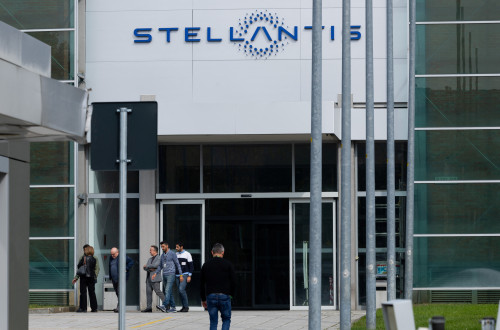 1
1 1
1
By Ann Saphir and Michael S. Derby
(Reuters) – Federal Reserve officials sit down Tuesday for their first meeting in 15 months with no pre-determined interest rate hike on the table in what amounts to the debut gathering of the “will-they-or-won’t-they” era.
With still-too-hot inflation riding their heels but abundant uncertainty about both the economic outlook and the lagged effects of 10 rate hikes since March 2022, a breather from increases looks to be in the cards when the rate-setting Federal Open Market Committee meeting concludes Wednesday.
But it may be a very short-lived hiatus.
That at least appears to be the latest “consensus” across the community of Fed watchers who’ve been either doubling down on longstanding calls, switching them, or – often in the same breath – throwing their hands and saying anything could happen.
The Fed will likely “leave rates unchanged but warn that additional tightening is still possible in the months ahead,” analysts at Wrightson ICAP said in predicting the Fed’s benchmark overnight lending rate would sit pat at 5-5.25%.
But, reflecting the hard time the team at Wrightson and other private economists have had making up their own minds since the Fed in May set the stage for a meeting-by-meeting approach from there, the firm told clients: “We wouldn’t have been surprised if the Fed had chosen to tighten again this month, but a majority of FOMC members, including the leadership, seemed to favor a pause.”
Over at Bank of America, economists have come down on the same side as Wrightson, though they said it was a close call.
“While incoming data point to resilience in activity and stickiness in inflation, the Fed appears to want additional time to monitor policy lags and regional bank stress,” they wrote. They expect the Fed to raise its target rate to 5.25%-5.5% at the July 25-26 meeting.
While that is the majority view, it’s not unanimous.
Citibank economists predict it will go the other way, with the Fed raising rates in June to temper what they also describe as “resilient” economic activity, a very-tight labor market and persistently strong wage and price inflation.
FOCUS ON COMMUNICATIONS
The same uncertainty is also apparent in Fed policymakers’ own assessments of their forecasts, last made in March and to be updated this week.
The fresh economic projections, along with tweaks to the Fed’s post-meeting statement and Fed Chair Jerome Powell’s comments in the post-meeting news conference, shape expectations for the rates path ahead, economists said. And it’s quite likely that if the Fed does hold off on rates it will prep markets for action later on.
“Among the key innovations for this meeting, we expect the statement will be hawkishly adjusted to note the potential for further tightening at ‘coming meetings,’” said forecasters at Deutsche Bank.
What’s more, “given resilient data, easing financial conditions, and a desire to prevent a pull forward in rate cut pricing, at this point there is little downside from Powell delivering a hawkish message,” the bank said in a note.
The last Fed forecasts released at the March meeting had penciled in a 5.1% stopping point for the federal funds rate target, where it is now.
Economists are debating how much of an upgrade that rate forecast gets, with forecasters speculating Fed policymakers will add between one and two more quarter percentage point increases for this year as it continues to contend with persistent underling price pressures. Each Fed policymaker’s view of the appropriate year-end policy rate is depicted by an anonymous “dot” on a grid.
“Communication will be important” and the dot plot will be key to managing expectations about the future, said Ryan Sweet, chief U.S. economist for forecasting firm Oxford Economics. “We expect seven dots to signal that the tightening cycle has ended but 11 dots to indicate more monetary policy tightening would be appropriate at future meetings.”
But there was disagreement over the dot plot as well.
“Once the Fed pauses at the June meeting, we think that the hurdle to resume hiking only increases,” Morgan Stanley economists wrote, forecasting no change to the median 2023 “dot” this week.
Some forecasters say that despite the uncertainty now surrounding the outlook the central bank would be best served by just going ahead and doing Wednesday what it probably expects it will have to do later this summer anyway.
Favoring a rate rise this week, Oscar Munoz, chief U.S. macro strategist of investment bank TD Securities said “if the hard data points to an economy that remains strong enough to make the Fed signal a likely rate hike for July, perhaps it is more optimal to go now.”
(Reporting by Ann Saphir, Michael S. Derby, Howard Schneider; Editing by Dan Burns)